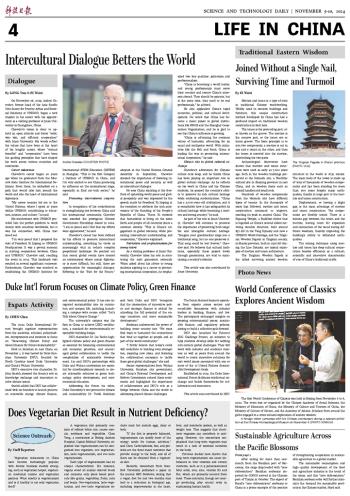
 Intercultural Dialogue Betters the World
Intercultural Dialogue Betters the World World Conference of Classics Explores Ancient Wisdom
World Conference of Classics Explores Ancient Wisdom Joined Without a Single Nail, Surviving Time and Turmoil
Joined Without a Single Nail, Surviving Time and Turmoil Duke Int'l Forum Focuses on Climate Policy, Green Finance
Duke Int'l Forum Focuses on Climate Policy, Green Finance Does Vegetarian Diet Result in Nutrient Deficiency?
Does Vegetarian Diet Result in Nutrient Deficiency? Sustainable Agriculture Across the Pacific Blossoms
Sustainable Agriculture Across the Pacific Blossoms
In recent years, China and Brazil have strengthened cooperation on sustainable agriculture, including planting "zero deforestation and zero vegetation destruction" soybeans, which means that soybean fields do not cause any deforestation or vegetation destruction in the production process.
To help curb deforestation in Brazil's soybean production, China has helped Brazil conduct land monitoring on some farms, draw risk maps and establish a "soybean traceability system" based on information provided by suppliers. Local farmers have also been trained on how to plant "zero deforestation" soybeans.
Giselle is a partner of a local farm in Brazil that grows about 1,000 hectares of soybeans each year. Since 2014, Giselle's farm has been a supplier to China. "Sustainability is one of the ideas of our farm, and China matches our values, so we chose to cooperate with it," she said.
At the 6th China International Import Expo in 2023, COFCO International and Modern farming Co., Ltd. reached a cooperation agreement on the procurement of "zero deforestation" Brazilian soybeans. The World Economic Forum (WEF) Tropical Forest Alliance, which facilitated the partnership, said the soybean order was a milestone.
"The Chinese market plays an important role in the global agricultural trade and can strongly promote the green transformation of the global agricultural value chain," Jack Hurd, executive director for the Tropical Forest Alliance of the WEF, said.
After sailing for more than one-month from the Brazilian port of Barcarena, the cargo ship loaded with "zero deforestation" Brazilian soybeans imported by COFCO arrived at the Chinese port of Tianjin in October. The export of Brazil's "zero deforestation" soybeans to China is a prime example of the practice of strengthening cooperation in sustainable agriculture to a global market.
The sustainable consumption and high-quality development of the food and agriculture industry is the trend of the times, and this "zero deforestation" Brazilian soybean order will further stimulate the demand for sustainable products in the Chinese market, Hurd said.






